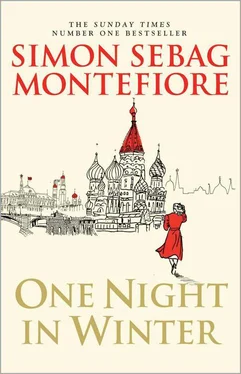By the morning, by the time the warders collected her slops bucket and then doled out the watery kasha and the thin tea with half a sugar lump, her date with George seemed a century ago. And then there were her parents. Did they know where she was? They seemed far away too. Even after a few hours of Lubianka, she was becoming a different person.
A warder opened the eyehole in her cell door that prisoners called ‘the Judas port’, and then the locks ground open and she was marched along the corridors, up the stairs, down some metal steps, through a padded door with more locks, into a new building without the smell of urine and detergent and the room where she was now sitting in front of a Formica desk with a single light. Moments later, the door had opened and this giant with general’s stars on his shoulderboards and kinky oiled hair had appeared to stand, hands on hips, looking at her.
‘Minka,’ he said now. ‘Help me tie this up. Tell me about Rosa and Nikolasha.’
‘They were together.’
‘As a couple? Did they fuck?’
‘Oh no, no one does that sort of thing. But they were together.’
‘Did they love each other?’
Minka looked down at her shoes: she was still wearing her pink sandals.
‘Sort of,’ she said, feeling a kind of betrayal.
Kobylov got up and left, kicking the door shut, swaggered down the corridor to the next door and opened it. Inside another child sat on his own.
George Satinov looked up, startled.
‘The girl named Rosa Shako loved Nikolasha Blagov?’ asked Kobylov. George blinked at him as if slightly disorientated. He still wore his football strip. Here was a boy who breathed privilege, Kobylov noticed, a right little baron’s son.
‘Yes.’
‘What sort of love? Puppy love? She wanted to marry him?’
‘Real love. Yes. She was so sweet, so romantic about him.’
‘I didn’t ask for her biography. Was it a crush on her part or the real thing?’
‘She probably wanted to marry him but—’
‘Just answer the questions. She loved him. He loved her. Case closed.’
George’s eye twitched and Kobylov could see that he was concentrating, choosing his words carefully. ‘Well…’
‘Good boy. That Minka’s a right beauty. Your girl?’
‘No.’
‘Have you kissed her?’
‘No.’
‘Have you fucked her?’
‘No, of course not.’ George raised his hands to his face, blushing.
‘What are you, a sissy?’ Kobylov smiled, relishing his power over the boy. ‘You see? I know all about you. Losha’s my old buddy. Oh yes, we’ve had some moments together, I can tell you.’
Kobylov got up, slammed the door, and went into the next interrogation room where Andrei Kurbsky was being interviewed by his keen subordinate, Mogilchuk.
‘Rosa adored Nikolasha,’ Andrei was saying. ‘She’d do anything for him.’
‘How did he treat her?’ asked Kobylov, taking charge.
‘He shouted at her. He belittled her. He was a real bully. He had to be in charge.’
‘Is this one cooperating?’ Kobylov asked Mogilchuk.
‘I am,’ said Andrei.
‘You’d better be,’ said Kobylov. ‘Because we know who you are, and you’re not like the others. We don’t have to wear silk gloves with you, Kurbsky. You’re the son of an Enemy of the People who’s wormed your way into that school, into the golden youth. And what we’re asking ourselves now is: Did you set up the murders?’
Andrei’s face went white. ‘No!’
‘If you turn out to be connected to this murder, you’ll receive the Vishka. ’ Kobylov used the acronym for the Highest Measure of Punishment: death. ‘Nine grams in the neck.’ He turned to Mogilchuk. ‘Do you believe him, comrade colonel?’
‘I’m not sure I do, comrade general,’ said Mogilchuk.
‘Me neither. So Rosa and Nikolasha were love’s young dream. Tell us what changed, Andrei?’
‘I wouldn’t say Nikolasha was…’
‘What changed? What made him kill her? Tell me or I’ll grind you into camp dust.’
Kobylov saw that Andrei was clasping his hands to stop them shaking.
‘I think… I think Nikolasha heard about his father’s posting to Mexico.’
Kobylov clapped his hands: ‘Of course! The posting! Nikolasha was going away!’
He grabbed Mogilchuk’s puny arm, heaved him out of the room and down the corridor. The prospect of a case solved in a matter of hours made his nostrils flare.
Minka looked up as the two men came into her interrogation room. One was the bejewelled giant with the kinky hair, the other the ginger-haired colonel in spectacles, dull enough to be an accountant.
‘Minka,’ said the giant. ‘When did Nikolasha find out about the posting to Mexico?’
‘A day before the Victory Parade.’
‘Was he happy about it?’ asked the ginger man, leaning over her. She felt nauseous suddenly.
‘No. He said he would refuse to go.’
‘Good!’ said the giant, clapping his hands. ‘Comrade Mogilchuk, let’s have a smoke.’
Out in the corridor, the two men huddled.
‘What do you think, comrade general?’ With grandees like Kobylov, thought Mogilchuk, one should use their titles and ranks whenever possible. ‘Are we getting close, comrade general?’
‘It was worth pulling ’em all in,’ replied Kobylov. He rubbed his hands together. ‘Let’s go and report to Lavrenti Pavlovich Beria. He’s going to be pleased with us, isn’t he?’
DR DASHKA DOROVA donned her white coat absentmindedly, shut the door of her surgery on the top floor of the Kremlevka, the Kremlin Clinic – and sat down on her velvet divan.
It was a cosy room decorated in old-style comfort with Persian rugs overlapping each other, oil paintings of dachas and woods from the turn of the century, an umbrella stand in brown leather, two soft leather chairs, the divan. To the right was a medical couch with a white curtain round it.
She usually sat behind an old desk with green leather on top and two Bakelite telephones on the side desk. The portrait of Stalin – always a guide to an official’s importance – was medium-sized, not an original Gerasimov, and not an oil, but her safe was a large one because the medical records of the leaders were a state secret.
Finally alone, she found she was breathing fast. Keep it together, Dashka, she told herself. The pressure of her different roles – mother, wife, doctor, minister – was suffocating – and there was more. It was too much and something, however precious, had to be sacrificed. Even at home, she had had to be careful: Genrikh believed the Party and its ‘fearless knights’, as he called the secret police, could do no wrong. There was a Bolshevik way to behave and he, as the Party’s conscience, its enforcer, would decide what it was because Comrade Stalin trusted him to know. Genrikh decided every detail of their life. He had to. He was a Bolshevik leader and nothing – neither the décor of their dacha, nor the recipe for lunch, nor the rules for their children – nothing was too small for him to pass judgement on it. And that made Dashka feel safe. Only her love of fashion had somehow been allowed outside Genrikh’s control.
But now Minka had been arrested, her adorable Minka. Dashka’s outer personality was sunny and exuberant but within she was a tangle of emotions and anxieties. Minka, darling, where are you? Are you safe? she whispered. Answer their questions and come home. Thank God, her other children were safe.
She loved all four of them passionately of course, but Senka, the fourth, the baby of her thirtieth year, the last, that miniature of herself with his long face, his full lips, the sprinkle of freckles across the nose, the olive skin, was her delight. Nothing else, no ambition, no other passion however cherished, counted for more than her Senka, her Little Professor.
Читать дальше












